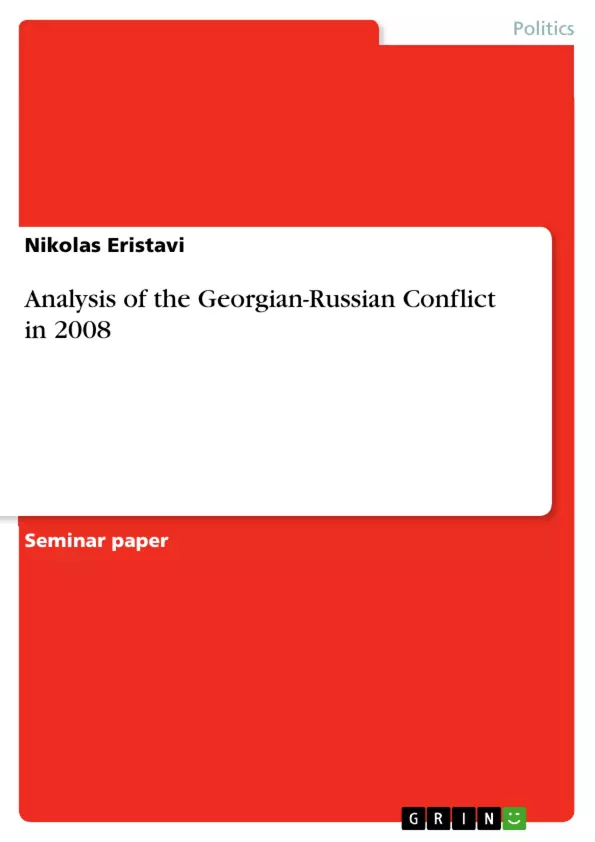There is never a single cause for war; it is a consequence of the amalgamation of people, leaders, organizations, agencies, political bodies, coalitions, and diplomatic relations that drive the international system into conflict. Nevertheless, how does a conflict as isolated as the 2008 Georgian war with Russia reverberate through the grand globe. To inspect the global level of analysis in terms of international relations, the individual, interstate and domestic levels must be accounted for to break down the onset and aftermath of war in the territories and overall impact on world trends. The 2008 conflict between the Republic of Georgia and the Russian Federation that began on the opening day of the Beijing Olympics is an interesting case where heads of state, political organizations and dwindling diplomatic negotiations can suddenly erupt into a bloody conflict that will shake the international system.
Inhaltsverzeichnis (Table of Contents)
- Analysis of the Georgian- Russian Conflict in 2008
- Individual Level of Analysis
- President Mikheil Saakashvili of Georgia
- Prime Minister Vladimir Putin of Russia
- Domestic Level of Analysis
- Ethnic Groups in Abkhazia and South Ossetia
- Russian Military Intervention
- Interstate Level of Analysis
- Diplomatic Relations
- Russian Military Exercises
- Georgian Military Response
- Global Level of Analysis
- Impact on Ukraine's Foreign Policy
- Western Response and Leverage
Zielsetzung und Themenschwerpunkte (Objectives and Key Themes)
This analysis aims to examine the complex factors that led to the 2008 Georgian-Russian conflict, exploring the interplay of individual, domestic, interstate, and global levels of analysis in shaping this event.
- The role of individual leaders, particularly President Mikheil Saakashvili and Prime Minister Vladimir Putin, in escalating tensions and leading to war.
- The impact of ethnic tensions and separatist movements in Abkhazia and South Ossetia, fueled by Russian influence and support.
- The breakdown of diplomatic relations and communication between Georgia and Russia, culminating in a military confrontation.
- The broader global implications of the conflict, including its effects on Ukraine's foreign policy and the West's strategic position in the region.
- The enduring theme of power dynamics and national interests in international relations, where temporary friendships are formed to achieve permanent goals.
Zusammenfassung der Kapitel (Chapter Summaries)
The analysis begins by outlining the complex nature of war, emphasizing that there is never a single cause. It then delves into the individual level of analysis, highlighting the roles of President Saakashvili and Prime Minister Putin in driving the conflict. The document goes on to explore the domestic level, focusing on the ethnic groups in Abkhazia and South Ossetia, their separatist aspirations, and the influence of Russian military intervention in the region.
The analysis then shifts to the interstate level, examining the breakdown of diplomatic relations and the escalation of tensions between Georgia and Russia, ultimately leading to the 2008 war. The final section explores the global implications of the conflict, examining the impact on Ukraine's foreign policy and the West's strategic position in the region.
Schlüsselwörter (Keywords)
The analysis focuses on the 2008 Georgian-Russian conflict, emphasizing the interplay of individual leadership, domestic tensions, interstate relations, and global implications. Key themes include ethnic conflict, separatism, Russian influence, Western strategy, and the dynamics of power in international relations.
Frequently Asked Questions
What caused the 2008 Georgian-Russian conflict?
The conflict was caused by an amalgamation of factors, including ethnic tensions in Abkhazia and South Ossetia, separatist movements, and the breakdown of diplomatic relations between Georgia and Russia.
What was the role of Mikheil Saakashvili?
As President of Georgia, his individual decisions and military response to separatist provocations were a key factor at the individual level of analysis in the onset of the war.
How did Russia intervene in the conflict?
Russia provided support to separatist groups and launched a full-scale military intervention, citing the protection of Russian citizens in the disputed territories.
What were the global implications of the war?
The war impacted Ukraine's foreign policy and forced the West to reassess its strategic leverage and diplomatic relations with the Russian Federation.
What are the levels of analysis used in this study?
The study accounts for four levels: the individual (leaders), domestic (ethnic groups), interstate (diplomacy), and global (international system) levels.
- Citation du texte
- Nikolas Eristavi (Auteur), 2010, Analysis of the Georgian-Russian Conflict in 2008, Munich, GRIN Verlag, https://www.grin.com/document/174409



